french resistance
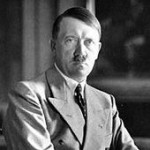
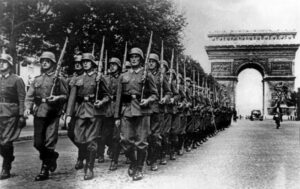 During World War II and even earlier really, Adolf Hitler was in the middle of his plan to take over the world. He was ruthless, and when he invaded a country, he didn’t care how many people died, as long as he got his way. The Battle of France took place between May 10, 1940 and June 25, 1940. The surrender of France to the Nazis in 1940 was a complex situation. The German invasion left metropolitan France at the mercy of Nazi armies. Really, once Paris fell on June 14, 1940, the German conquest of France was complete. Part of the problem was that Marshal Henri Petain replaced Paul Reynaud as prime minister and proved to be a weak leader who announced his intention to sign an armistice with the Nazis.
During World War II and even earlier really, Adolf Hitler was in the middle of his plan to take over the world. He was ruthless, and when he invaded a country, he didn’t care how many people died, as long as he got his way. The Battle of France took place between May 10, 1940 and June 25, 1940. The surrender of France to the Nazis in 1940 was a complex situation. The German invasion left metropolitan France at the mercy of Nazi armies. Really, once Paris fell on June 14, 1940, the German conquest of France was complete. Part of the problem was that Marshal Henri Petain replaced Paul Reynaud as prime minister and proved to be a weak leader who announced his intention to sign an armistice with the Nazis.
While not very well known at the time, French General Charles de Gaulle, made a broadcast on June 18, 1940, to France from England, where he would help with the resistance. The Appeal of June 18 was the first speech made by Charles de Gaulle after his arrival in London in 1940 following the Battle of France. The speech was broadcast to Vichy France by the radio services of the British Broadcasting Corporation (BBC). This speech is considered to have marked the beginning of the French Resistance in World War II. It is regarded as one of the most important speeches in French history. General de Gaulle said in his speech, “The leaders who, for many years, were at the head of French armies, have formed a government. This government, alleging our armies to be undone, agreed with the enemy to stop fighting. Of course, we were subdued by the mechanical, ground and air forces of the enemy. Infinitely more than their number, it was the tanks, the airplanes, the tactics of the Germans which made us retreat. It was the tanks, the airplanes, the tactics of the Germans that surprised our leaders to the point to bring them there where they are today.
But has the last word been said? Must hope disappear? Is defeat final? No!
Believe me, I speak to you with full knowledge of the facts and tell you that nothing is lost for France. The same means that overcame us can bring us to a day of victory. For France is not alone! She is not alone! She is not alone! She has a vast Empire behind her. She can align with the British Empire that holds the sea and continues the fight. She can, like England, use without limit the immense industry of United States.
This war is not limited to the unfortunate territory of our country. This war is not finished by the battle of France. This war is a world wide war. All the faults, all the delays, all the suffering, do not prevent there to be, in the world, all the necessary means to one day crush our enemies. Vanquished today by mechanical force, we will be able to overcome in the future by a superior mechanical force.
The destiny of the world is here. I, General de Gaulle, currently in London, invite the officers and the French soldiers who are located in British territory or who would come there, with their weapons or without their weapons, I invite the engineers and the special workers of armament industries who are located in British territory or who would come there, to put themselves in contact with me.
Whatever happens, the flame of the French resistance must not be extinguished and will not be extinguished.”
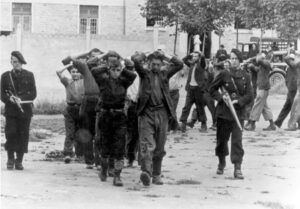
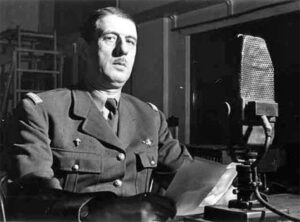 His work with the French Resistance made Charles de Gaulle almost a household word in France. It gave the people hope for freedom. The French Resistance fought to the death to beat the Nazis. This makes me think of current times, and all the freedoms that we have lost. These lessons from the French Resistance are valuable to this day. Never give up. You only lose a battle when you quit fighting. We must never quit fighting.
His work with the French Resistance made Charles de Gaulle almost a household word in France. It gave the people hope for freedom. The French Resistance fought to the death to beat the Nazis. This makes me think of current times, and all the freedoms that we have lost. These lessons from the French Resistance are valuable to this day. Never give up. You only lose a battle when you quit fighting. We must never quit fighting.
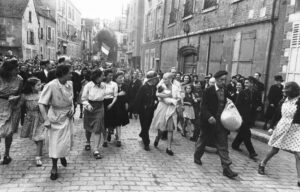 Having a baby is normally a blessed event, but it is also important to be having the baby with the right person. I know that sound like something that is between the man and the woman, and it’s nobody’s business but their own, and I would agree with you on that. However, during World War II, the Nazi regime was so hated that the nations they terrorized didn’t want anything to do with them…so much so that French women having babies with German soldiers were punished by shaving their heads bald and parading them through town. This was done so that everyone would know they betrayed their country, and so they had.
Having a baby is normally a blessed event, but it is also important to be having the baby with the right person. I know that sound like something that is between the man and the woman, and it’s nobody’s business but their own, and I would agree with you on that. However, during World War II, the Nazi regime was so hated that the nations they terrorized didn’t want anything to do with them…so much so that French women having babies with German soldiers were punished by shaving their heads bald and parading them through town. This was done so that everyone would know they betrayed their country, and so they had.
The Nazi regime was set on creating “the perfect race,” in their opinion anyway. They wanted everyone to be light skinned, blond haired, and blue eyed, and those who weren’t had to prove their genetic lines. The Nazis even went so far as to set up places that women (of the right bloodlines) were sent to have their children, conceived with German soldiers. Then, the plan was that they would give their children up for adoption by a Nazi couple who was having trouble conceiving. It was Hitler’s way of preserving the “right” bloodline. Many times, if the woman changed her mind, and wanted to keep the baby, but refused to marry the soldier, their babies were taken from the by force, even if it meant taking their lives. Some of these 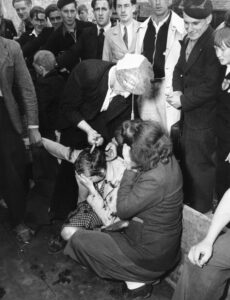 women were in it for the money and had no intention of keeping their babies. They were a simply a “Nazi Baby Machine.”
women were in it for the money and had no intention of keeping their babies. They were a simply a “Nazi Baby Machine.”
Once it was discovered that these women were doing this, they were marked as traitors. Often their own families disowned them. These women might not even be having babies with the Nazi soldiers, just having relations with them. The soldiers saw nothing wrong with hooking up with these women to ply them for information. It was an act of treason on the part of the women. They shouldn’t have allowed themselves to become involved with the Nazi soldiers, because they just had to know that was wrong. Treason is such a dark side of war. Still, there are many dark sides to war, and in most cases, it is the innocent and oppressed that suffer.
The French resistance brought out another dark side to the war, and it was rather brutal, but they felt like it was justified. Looking at it now, I think the beating part was the probably brutal, but maybe still have been justified. Basically, the French Resistance, when women were caught in a physical relationship with a Nazi, shaved their heads, beat the women who had been charged with collaborating with the enemy, and then paraded them around town as a form of punishment. The punishment was followed by harassing the women, with no repercussion for the beatings, head shavings, or the harassing. In France, a woman’s long hair is supposed to be seductive, so shaving their heads, was a way to make them look undesirable. The practice dates back to Biblical times. It was a common punishment for adultery. During the 20th century, it was reintroduced as a means to ridicule women who had physical relationships with the enemy or were prostitutes. 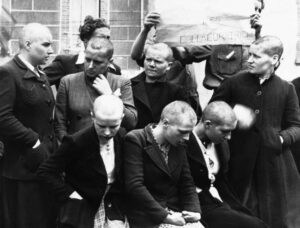 The French Resistance took a page from Bible times, and so it came to pass that during World War II, this act of humiliation was repeated on French women accused of collaborating with the German soldiers. Apart from shaving their heads, they were paraded in the streets, marked with black ink, and even stripped half-naked. At least 20,000 women have been documented to have had their heads shaved. I’m not a proponent of violence, but traitors need to be punished, and after something like that, I would think these women would think twice before getting involved with the Nazi soldiers. and any woman who hadn’t done so, would think twice before even considering such a heinous act.
The French Resistance took a page from Bible times, and so it came to pass that during World War II, this act of humiliation was repeated on French women accused of collaborating with the German soldiers. Apart from shaving their heads, they were paraded in the streets, marked with black ink, and even stripped half-naked. At least 20,000 women have been documented to have had their heads shaved. I’m not a proponent of violence, but traitors need to be punished, and after something like that, I would think these women would think twice before getting involved with the Nazi soldiers. and any woman who hadn’t done so, would think twice before even considering such a heinous act.
 During World War II, the Nazis had a little problem…the resistance. Of course, the resistance had to be very careful, and stay in hiding much of the time. There were informants, the police, and the enemy soldiers to watch out for. It was hard to tell sometimes who was an enemy and who was a friend. Every day was spent in hiding, and often in fear for their lives.
During World War II, the Nazis had a little problem…the resistance. Of course, the resistance had to be very careful, and stay in hiding much of the time. There were informants, the police, and the enemy soldiers to watch out for. It was hard to tell sometimes who was an enemy and who was a friend. Every day was spent in hiding, and often in fear for their lives.
With the Allied invasion of Normandy, the French resistance saw an opportunity to really increase their activity in the area. Of course, there were more fighter pilots in need of an escape routes, and soldiers who were wounded, but they also saw a way to strike back. One such way was to kidnap and kill Helmut Kampfe, a major in the Waffen-SS Das Reich. Of course, all resistance action came at a cost. Following the killing of Kampfe, a battalion of the regiment known  as Der Fuhrer Regiment was sent to the small village of Oradour-sur-Glane.
as Der Fuhrer Regiment was sent to the small village of Oradour-sur-Glane.
Of course, the village was innocent, but someone had to pay so Commander Adolf Diekmann ordered the town sealed off, the men locked in barns, and the women and children confined to the church. Nobody knows why the town was chosen for this attack. Maybe it was due to the town’s proximity to the regiment, or maybe it was because the Germans knew the village was defenseless. Whatever it was, it was about to get brutal.
Diekmann ordered his unit to begin shooting. It was like a terrorist attack. The residents were first incapacitated by gunshots to the legs. When they 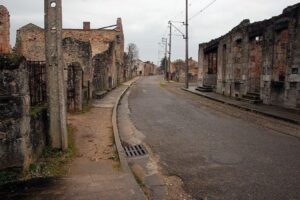 were unable to move, the barns and church were doused with gasoline and ignited. Hundreds of the villagers died that day, nearly all the residents of the area. Many of the SS who were there that day were Alsatian French nationals who had been forced into the German military, and almost all them escaped punishment, which is a crime in itself. After World War II, French president Charles De Gaulle declared that the village was never to be restored. It was to stand as it was after the attack, as a reminder of the brutal Nazi occupation. Brutality like that should never be forgotten, and maybe the evidence should stand as a reminder of the evil that exists in some people. Lest we forget.
were unable to move, the barns and church were doused with gasoline and ignited. Hundreds of the villagers died that day, nearly all the residents of the area. Many of the SS who were there that day were Alsatian French nationals who had been forced into the German military, and almost all them escaped punishment, which is a crime in itself. After World War II, French president Charles De Gaulle declared that the village was never to be restored. It was to stand as it was after the attack, as a reminder of the brutal Nazi occupation. Brutality like that should never be forgotten, and maybe the evidence should stand as a reminder of the evil that exists in some people. Lest we forget.
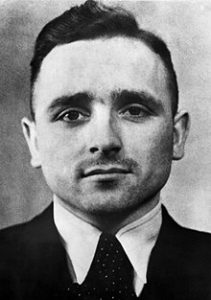 The Third Reich was filled with people who were nothing less than monsters. Klaus Barbie, the former Nazi Gestapo chief of German-occupied Lyon, France, was one of them. As chief of the secret police in Lyon, Barbie sent 7,500 French Jews and French Resistance partisans to concentration camps, and executed some 4,000 others. He, like the other Nazi officers had no compassion…just a heart filled with hatred. Barbie wasn’t happy with just having them killed, he personally tortured and executed many of his prisoners himself. In 1943, he captured Jean Moulin, the leader of the French Resistance, and had him slowly beaten to death. He took pleasure in the suffering of that good man. In 1944, Barbie rounded up 44 young Jewish children and their seven teachers hiding in a boarding house in Izieu and deported them to the Auschwitz extermination camp. Of the 51 people deported, only one teacher survived. In August 1944, as the Germans prepared to retreat from Lyon, he organized one last deportation train that took hundreds of people to the death camps. He didn’t want to “lose” a single one to the liberation.
The Third Reich was filled with people who were nothing less than monsters. Klaus Barbie, the former Nazi Gestapo chief of German-occupied Lyon, France, was one of them. As chief of the secret police in Lyon, Barbie sent 7,500 French Jews and French Resistance partisans to concentration camps, and executed some 4,000 others. He, like the other Nazi officers had no compassion…just a heart filled with hatred. Barbie wasn’t happy with just having them killed, he personally tortured and executed many of his prisoners himself. In 1943, he captured Jean Moulin, the leader of the French Resistance, and had him slowly beaten to death. He took pleasure in the suffering of that good man. In 1944, Barbie rounded up 44 young Jewish children and their seven teachers hiding in a boarding house in Izieu and deported them to the Auschwitz extermination camp. Of the 51 people deported, only one teacher survived. In August 1944, as the Germans prepared to retreat from Lyon, he organized one last deportation train that took hundreds of people to the death camps. He didn’t want to “lose” a single one to the liberation.
Like all cowards, Barbie returned to Germany after the war, and began his disguise. He burned off his SS identification tattoo and assumed a new identity. This was planned as the Germans began to realize that they had lost the war. The plan was to smuggle these former SS officers out of the country, so they could “regroup later, and start the Third Reich or a facsimile of it in the future. After the Americans offered him money and protection in exchange for his intelligence services, Barbie surrendered himself to the US Counter-Intelligence Corps (CIC) and engaged in underground anti-communist activity in June 1947. Barbie worked as a US agent in Germany for two years, and the Americans shielded him from French prosecutors trying to track him down. 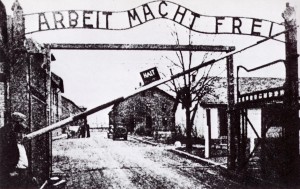 That frustrates me, but I suppose they figured it was the lesser of the two evils. They could go after the “bigger fish” in the organization. In 1949, Barbie and his family were smuggled by the Americans to South America.
That frustrates me, but I suppose they figured it was the lesser of the two evils. They could go after the “bigger fish” in the organization. In 1949, Barbie and his family were smuggled by the Americans to South America.
Once he was in Bolivia, Barbie assumed the name of Klaus Altmann. He settled in Bolivia and continued his work as a US agent. He became a successful businessman and advised the military regimes of Bolivia. In 1971, the oppressive dictator Hugo Banzer Suarez came to power, and Barbie helped him set up brutal internment camps for his many political opponents. During his 32 years in Bolivia, Barbie also served as an officer in the Bolivian secret police, participated in drug-running schemes, and founded a rightist death squad. He regularly traveled to Europe, and even visited France, where he had been tried in absentia in 1952 and 1954 for his war crimes and sentenced to death. He was so bold, thinking that he was invincible, but as it is in most criminals, they get careless. In 1972, the Nazi hunters Serge Klarsfeld and Beatte Kunzel discovered Barbie’s whereabouts in Bolivia, but Banzer Suarez refused to extradite him to France.
In the early 1980s, a liberal Bolivian regime came to power and agreed to extradite Barbie in exchange for French aid. His protection gone, on January 19, 1983, Barbie was arrested. He arrived in France on February 7, 1983. Unfortunately, the statute of limitations had expired on his in-absentia convictions from the 1950s. He was going to have to be tried again. At this point, the United States government formally apologized to France for its conduct in the Barbie case later that year. Even then, because of legal wrangling between the groups representing his victims, the trial was delayed for four years. Finally, on May 11, 1987, the “Butcher of Lyon,” 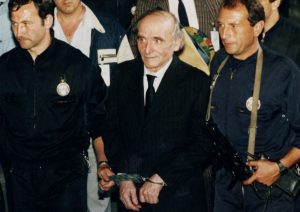 as he was known in France, went on trial for his crimes against humanity. His defense attorneys, three minority lawyers…an Asian, an African, and an Arab, actually made the dramatic case that the French and the Jews were as guilty of crimes against humanity as Barbie or any other Nazi. That was a completely unbelievable atrocity of a defense. Barbie’s lawyers seemed more intent on putting France and Israel on trial than in proving their client’s innocence. Their efforts failed and on July 4, 1987, he was found guilty. For his crimes, the 73-year-old Barbie was sentenced to France’s highest punishment…to spend the rest of his life in prison. He died of cancer in a prison hospital in 1991.
as he was known in France, went on trial for his crimes against humanity. His defense attorneys, three minority lawyers…an Asian, an African, and an Arab, actually made the dramatic case that the French and the Jews were as guilty of crimes against humanity as Barbie or any other Nazi. That was a completely unbelievable atrocity of a defense. Barbie’s lawyers seemed more intent on putting France and Israel on trial than in proving their client’s innocence. Their efforts failed and on July 4, 1987, he was found guilty. For his crimes, the 73-year-old Barbie was sentenced to France’s highest punishment…to spend the rest of his life in prison. He died of cancer in a prison hospital in 1991.
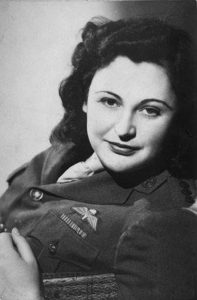 When I think of some of the civilian heroes of our wars, I find myself amazed at the many courageous acts they carried out. They threw caution to the wind and moved about among the enemy, somehow managing to remain almost invisible. They had code names and secret pasts that no one knew about, not even the people they worked with…and definitely not the enemy they worked against.
When I think of some of the civilian heroes of our wars, I find myself amazed at the many courageous acts they carried out. They threw caution to the wind and moved about among the enemy, somehow managing to remain almost invisible. They had code names and secret pasts that no one knew about, not even the people they worked with…and definitely not the enemy they worked against.
One of these spies was Nancy Grace Augusta Wake, who was also known by her married name, Nancy Fiocca. Wake was a New Zealand-born nurse and journalist, who joined the French Resistance and later the Special Operations Executive (SOE) during World War II. Born August 30, 1912 in Roseneath, Wellington, New Zealand, the youngest of the six children of Charles Augustus Wake and Ella Rosieur Wake. In 1914, the family moved to Australia and settled at North Sydney. Shortly thereafter, Wake’s father returned to New Zealand and her mother raised the children. In Sydney, Wake attended the North Sydney Household Arts (Home Science) School.
At the age of 16, she ran away from home and worked as a nurse. With £200 (about $255.27) that she had inherited from an aunt, she traveled to New York City, then London where she trained herself as a journalist. In the 1930s, she worked in Paris and later for Hearst newspapers as a European correspondent. She witnessed the rise of Adolf Hitler and the Nazi movement and “saw roving Nazi gangs randomly beating Jewish men and women in the streets” of Vienna. The Nazi movement repulsed her.
In 1937, Wake met wealthy French industrialist Henri Edmond Fiocca, whom she married on November 30, 1939. They were living in Marseille, France when Germany invaded. During the war in France, Wake served as an ambulance driver. After the fall of France in 1940, she joined the French Resistance, working in the escape network of Captain Ian Garrow, which became the Pat O’Leary Line. Wake had an incredible ability to elude capture, which earned her the nickname, “White Mouse” by the Gestapo. The Resistance exercised caution with her missions, because her life was in constant danger. The Gestapo tapped her telephone and intercepted her mail. In spite of the danger, Wake said, “I don’t see why we women should just wave our men a proud goodbye and then knit them balaclavas.” As a member of the escape network, she helped Allied airmen evade capture by the Germans and escape to neutral Spain.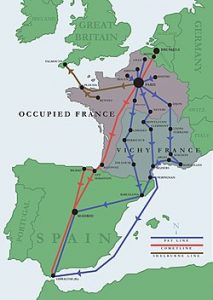
In November 1942, Wehrmacht troops occupied the southern part of France after the Allies’ Operation Torch had started. This gave the Germans and the Gestapo unrestricted access to all parts of Vichy France and made life more dangerous for Wake. When the network was betrayed that same year she decided to flee France. Her husband, Henri Fiocca, stayed behind. He later was captured, tortured, and executed by the Gestapo. She threw caution to the wind. She would “doll” herself up and be very flirtatious, almost daring them to search her. She took a chance, and they couldn’t see past her façade to the ruthless spy beneath the beauty she showed on the outside.
In 1943, when the Germans became aware of her, she escaped to Spain and continued on to the United Kingdom. After reaching Britain, Wake joined the Special Operations Executive (SOE) under the code name Hélène. On April 29-30, 1944 as a member of a three person SOE team code-named “Freelance,” Wake parachuted into the Allier department of occupied France to liaise between the SOE and several Maquis groups in the Auvergne region, which were loosely overseen by Emile Coulaudon (code name “Gaspard”). She participated in a battle between the Maquis and a large German force in June 1944. In the aftermath of the battle, she bicycled 500 kilometers to send a situation report to SOE in London. In early 1943, in the process of getting out of France, Wake was picked up with a whole trainload of people and was arrested in Toulouse, but was released four days later. The head of the O’Leary Line, Albert Guérisse, managed to have her released by claiming she was his mistress and was trying to conceal her infidelity to her husband (all of which was untrue). She succeeded in crossing the Pyrenees to Spain. Until the war ended, she was unaware of her husband’s death, and she subsequently blamed herself for it. Wake was a recipient of the George Medal from the United Kingdom, the Medal of Freedom from the United States, the Legion of Honor from France, and medals from Australia and New Zealand.
In 1985, Wake published her autobiography, “The White Mouse.” Later, after 40 years of marriage, her second husband John Forward died at Port Macquarie on 19 August 1997. The couple had no children. Wake sold her medals to fund herself saying, “There was no point in keeping them, I’ll probably go to hell and they’d melt anyway.” Strangely, this disregard of the value of war medals, seemed common among the war spies. In 2001, Wake left Australia for the last time and emigrated to London. She became a resident at the Stafford Hotel in Saint James’ Place, near Piccadilly, formerly a British and American forces club during the war. She had been introduced to her first “bloody good drink” there by Louis Burdet, the general manager at the time, who had  also worked for the Resistance in Marseille. Mornings usually found Wake in the hotel bar, sipping her first gin and tonic of the day. She was welcomed at the hotel, celebrating her ninetieth birthday there. Out of deep respect for her, the hotel owners absorbed most of the costs of her stay. In 2003, Wake chose to move to the Royal Star and Garter Home for Disabled Ex-Service Men and Women, in Richmond, London, where she remained until her death on Sunday evening August 7, 2011, aged 98, at Kingston Hospital, where she had been admitted with a chest infection. She had requested that her ashes be scattered at Montluçon in central France. Her ashes were scattered near the village of Verneix, which is near Montluçon, on March 11, 2013.
also worked for the Resistance in Marseille. Mornings usually found Wake in the hotel bar, sipping her first gin and tonic of the day. She was welcomed at the hotel, celebrating her ninetieth birthday there. Out of deep respect for her, the hotel owners absorbed most of the costs of her stay. In 2003, Wake chose to move to the Royal Star and Garter Home for Disabled Ex-Service Men and Women, in Richmond, London, where she remained until her death on Sunday evening August 7, 2011, aged 98, at Kingston Hospital, where she had been admitted with a chest infection. She had requested that her ashes be scattered at Montluçon in central France. Her ashes were scattered near the village of Verneix, which is near Montluçon, on March 11, 2013.
 Whenever I come across a book about World War II, and especially about a B-17 Bomber, I want to read it. That subject holds my interest mostly because my dad, Allen Spencer was a top turret gunner and flight engineer on a B-17 bomber stationed at Great Ashfield, Suffolk, England. Lately, I have been “reading” by way of Audible.com, and I must say that having a book read to you, allows you to sit back and enjoy it as if you were watching it unfold before your very eyes. So, when I came across a book called The Lost Airman written by Seth Meyerowitz, I knew I had to hear about it. As the true story began, I found that Arthur Meyerowitz (Seth Meyerowitz’ grandfather) could have been my own dad…at least to the extent that both of them were in the Eight Air Force stationed in England. Arthur was assigned to a B-24 Liberator. At first their experiences were probably almost identical. Arriving at his base, Arthur heard the men who had been there a while, tease the newcomers with things like “You’ll be sorry you came here” or “Look, fresh meat.” I can only imagine how that kind of thing must have felt to the new and often very young airmen…like a swift kick in the gut!! Then the book went on to tell how the airmen felt on their first mission, when no one could eat breakfast, because of the churning in their stomach. Arthur was the flight engineer and top turret gunner, just like my dad had been. It was the job of the flight engineer to check the plane over to ensure that it was fight worthy, and report to the captain. Arthur found problems with their plane, Harmful Lil Armful, and told his captain it needed repairs, but his captain wouldn’t hear of it. He was close to going home, and wanted his last mission out of the way, and besides what did this “newbie” know. He was only on his second mission, and he was filling in for someone else. So, they took off…a catastrophic decision.
Whenever I come across a book about World War II, and especially about a B-17 Bomber, I want to read it. That subject holds my interest mostly because my dad, Allen Spencer was a top turret gunner and flight engineer on a B-17 bomber stationed at Great Ashfield, Suffolk, England. Lately, I have been “reading” by way of Audible.com, and I must say that having a book read to you, allows you to sit back and enjoy it as if you were watching it unfold before your very eyes. So, when I came across a book called The Lost Airman written by Seth Meyerowitz, I knew I had to hear about it. As the true story began, I found that Arthur Meyerowitz (Seth Meyerowitz’ grandfather) could have been my own dad…at least to the extent that both of them were in the Eight Air Force stationed in England. Arthur was assigned to a B-24 Liberator. At first their experiences were probably almost identical. Arriving at his base, Arthur heard the men who had been there a while, tease the newcomers with things like “You’ll be sorry you came here” or “Look, fresh meat.” I can only imagine how that kind of thing must have felt to the new and often very young airmen…like a swift kick in the gut!! Then the book went on to tell how the airmen felt on their first mission, when no one could eat breakfast, because of the churning in their stomach. Arthur was the flight engineer and top turret gunner, just like my dad had been. It was the job of the flight engineer to check the plane over to ensure that it was fight worthy, and report to the captain. Arthur found problems with their plane, Harmful Lil Armful, and told his captain it needed repairs, but his captain wouldn’t hear of it. He was close to going home, and wanted his last mission out of the way, and besides what did this “newbie” know. He was only on his second mission, and he was filling in for someone else. So, they took off…a catastrophic decision.
This was where and similarities between Arthur’s experiences, and those of my dad ended, because my dad was not shot down like Arthur’s plane was. At the point Arthur’s plane was going down, his pilot and co-pilot showed incredible cowardice, and abandoned the plane first…something that was just not done. Arthur tried to  make sure everyone was off, but in the end, one man was stuck and injured. He told Arthur to go and take the newcomer with him, but the newcomer wouldn’t go. He fought Arthur, and actually kicked him off the plane, physically. As Arthur fell, he was sickened by the fact that his pilot and co-pilot jumped first, and that his friends would not be coming home. The pilot and co-pilot spent the rest of the war in a prison camp, but the outcome for Arthur was different, and in fact, miraculous, in more ways than one, because Arthur was not only an airman in the US Army Air Forces, but he was also a Jewish man facing the Nazis in World War II…a perilous place to be.
make sure everyone was off, but in the end, one man was stuck and injured. He told Arthur to go and take the newcomer with him, but the newcomer wouldn’t go. He fought Arthur, and actually kicked him off the plane, physically. As Arthur fell, he was sickened by the fact that his pilot and co-pilot jumped first, and that his friends would not be coming home. The pilot and co-pilot spent the rest of the war in a prison camp, but the outcome for Arthur was different, and in fact, miraculous, in more ways than one, because Arthur was not only an airman in the US Army Air Forces, but he was also a Jewish man facing the Nazis in World War II…a perilous place to be.
It was at this point in the book that my interest in it changed, because this could have been the fate of my dad, had his plane been shot down, but it hadn’t. While the outcome for Arthur was better than that of his crew mates, he still went through a harrowing experience, as did those who helped him. Arthur came down in occupied France on December 31, 1943, and in his landing, he badly hurt his back. From that point on, Arthur came in contact with some of the most amazing people on earth in that or any other time. The French resistance network took Arthur in, and over the next six months, they slowly smuggled him and a British Airman out through Spain to the Rock of Gibraltar. These people did this with precision and secrecy. They knew that if they were caught, they would be killed, but they hated the Nazis, and would do anything to fight against the Nazi regime…right up to, and for some, including giving their lives. The chances they took and the hardships they faced…voluntarily, were so far above and beyond the call of duty, that it almost seemed like a fictional movie. You know, the kind where the good guys always win, and the bad guys always lose. Nevertheless, this wasn’t a fictional movie, and the lives lost were real, but Arthur 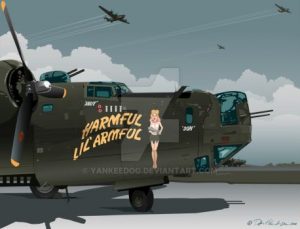 Meyerowitz was not among the lives lost. His was saved because of the selfless acts of so many people in the French Resistance. The story of Arthur Meyerowitz was, for me, so moving that in the end, I cried, and throughout the book, there were moments that I could hardly breathe with the tension of the situations they found themselves in. I felt bad to think it, but I was so thankful that my dad’s B-17 always made it home, and he never had to face the prison camps, or try to escape from a hostile nation. For Arthur, his escape was miraculous, and I believe it was because of the fervent prayers of his family and the undying faith of his mother, who believed that God would bring her son home…and God did.
Meyerowitz was not among the lives lost. His was saved because of the selfless acts of so many people in the French Resistance. The story of Arthur Meyerowitz was, for me, so moving that in the end, I cried, and throughout the book, there were moments that I could hardly breathe with the tension of the situations they found themselves in. I felt bad to think it, but I was so thankful that my dad’s B-17 always made it home, and he never had to face the prison camps, or try to escape from a hostile nation. For Arthur, his escape was miraculous, and I believe it was because of the fervent prayers of his family and the undying faith of his mother, who believed that God would bring her son home…and God did.

